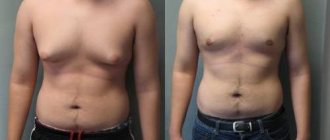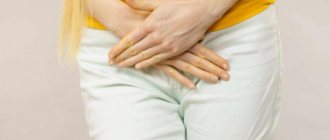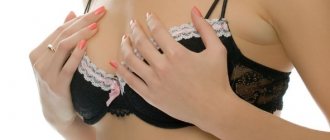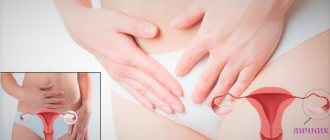Causes of itching under the breasts
There are about 10 main reasons for the appearance of an itchy sensation in the mammary glands. These factors are associated with a genetic predisposition to the development of certain diseases, an unhealthy lifestyle, and incorrect selection of underwear. A small number of pathological processes that cause itching in the décolleté area occur in a latent form. A woman may not be aware of some of them. In all cases of deterioration in health, it is advisable to consult a doctor - undergo an examination, examination and receive competent prescriptions.
Choose a specialist, read reviews and make an appointment with a therapist online
Allergy
Itching under the mammary glands occurs due to intolerance to certain substances. These include particles of dye from the synthetic fabric from which the bra is made, molecules of detergent or perfume. It may even take several minutes from the moment the irritant hits the skin until the initial symptoms appear. In addition to itching in the décolleté area, allergies manifest themselves:
- Redness of the skin, the formation of weeping areas and rashes on it.
- Increased body temperature.
- Pain that intensifies at the site of itchy areas.
If an allergy develops, treatment should begin by stopping the exposure of the body to the irritant. Then the patient is administered antihistamines - Diazolin, Suprastin, Tavegil. This volume of treatment is sufficient to eliminate allergies and clinical manifestations of the condition.
Stress
Due to psycho-emotional shock, unpleasant sensations can occur in different parts of the body. Itching and the appearance of goosebumps are collectively caused by a slowdown in the activity of the adrenal glands - the organ cannot cope with the increased production of histamine. As a result, the patient experiences itching under the mammary glands, the skin becomes swollen and red. Additional concerns include hand tremors, insomnia, and loss of appetite.
Fungal infection
In the area of the mammary glands, body temperature is increased due to increased blood supply, which is normal, and also due to wearing a tight bra. The second factor predisposes to increased sweat production. A favorable environment for the development of fungus is humid and warm. With a decrease in immunity and minor damage to the skin (for example, when rubbing with bra tissue), pathogenic microflora penetrates into the resulting microscopic wounds.
Signs of fungal infection of the mammary glands:
- Severe itching that is not relieved by scratching
- Pain in the décolleté area
- The appearance of areas of redness on the skin under the mammary glands, and on their surface - crusts that do not come off on their own
Fungal infections of the skin of the mammary glands are eliminated with Clotrimazole and its analogues. Additionally, they may prescribe oral administration of Fluconazole and a diet that involves avoiding the consumption of sweets, baked goods, and alcohol.
Hyperhidrosis
Excessive sweating is the result of a genetic factor, diabetes mellitus, and wearing an overly tight bra, especially one made of synthetic fabric. An additional reason is the lack of timely hygiene procedures, in which sweat and pollution particles are not eliminated, allowing the development of skin inflammation.
Hyperhidrosis of the chest area is manifested by the following symptoms:
- Itching, which constantly worsens and causes scratching on the skin
- Redness of tissues
- Pain in inflamed areas of the epithelium
- Swelling of affected tissues
- Small rashes under the breasts
To stop the disease, it is recommended to observe hygienic measures and treat inflamed areas with antiseptic solutions. For severe itching, antihistamines are prescribed.
Changes in hormonal levels
Fluctuations in hormones in a woman’s blood are observed during puberty, menopause, gestation, lactation, and after termination of pregnancy. Itching in the mammary glands is just one of the many manifestations of imbalance. Additional symptoms of hormonal imbalance:
- Tugging sensations in the lower abdomen
- Irritability, insomnia
- Decreased libido
- Failure of the menstrual cycle
- Increased dryness of the vaginal mucosa
- The appearance of mucous vaginal discharge
The deterioration of the condition of the skin is directly related to changes in the concentration of estrogen in the blood. To balance their content in the body, the woman is prescribed hormonal therapy.
Skin diseases
Pathologies such as dermatitis, psoriasis, eczema in 95% of cases are accompanied by intense itching in the décolleté area. Other symptoms of these conditions are the appearance of scales on the tissues, redness, weeping of the wounds, and pain. Depending on the type of skin disease, a woman may develop red or pink areas, small rashes, and a local increase in body temperature. Itching is eliminated as the underlying pathology is treated.
Some diseases, such as eczema and psoriasis, progress over years, periodically only going into remission. The reason for the development of these pathologies is sweating of the mammary glands, wearing a too tight bra, and insufficient hygiene procedures.
Autoimmune diseases
This is a group of pathologies that cannot be completely eliminated. Thanks to medication, it is only possible to reduce the severity of the symptoms of these diseases. The drugs stop the signs of the pathological process, remission occurs, but then, due to destabilization of the immune system, the condition worsens. The body's protective properties can be deactivated due to stress and lack of sleep.
Ectasia of the milk ducts
A pathology in which the internal canals of the mammary glands are damaged, which contributes to the expansion of the lumen of these structures. Women over 40 years of age are at risk of developing pathology. The causes of the disease have not been precisely established. Factors contributing to the development of mammary duct ectasia are bad habits, pregnancy, and previous injuries to the mammary glands. In addition to the itching that occurs in the décolleté area, concerns about the presence of a lump in the breast, discharge from the nipple, and pain inside the areola. The affected gland becomes larger in size.
Mastitis
Breast inflammation caused by stagnation of milk, hypothermia, pathogenic microflora entering through microdamage to tissue. For example, after a diagnostic puncture or piercing. Mastitis occurs in the form of severe symptoms:
- Body temperature rises to high levels.
- The breasts swell, take on a purple hue, and become hot to the touch.
- The inflamed gland increases significantly in size.
- The pain syndrome is difficult to relieve even with analgesics.
- Pus or serous fluid is discharged from the nipples.
- The inflamed gland becomes so sensitive that it is problematic to wear a bra.
Mastitis is eliminated through antibiotic therapy and the use of non-steroidal anti-inflammatory drugs. In case of extensive purulent lesions of the mammary glands, drainage of the breast is performed so that pathological masses do not accumulate. If mastitis is caused by lactostasis (stagnation of milk), the patient is pumped, but for therapeutic purposes, and not for feeding the child. Since the woman additionally takes antibiotics, the newborn is transferred to artificial nutrition.
The main purpose of examination for mastitis is to exclude the development of a malignant neoplasm.
Internal diseases
Pathologies such as diabetes mellitus are accompanied by tissue irritation and the appearance of ulcers in the décolleté area. Other symptoms of the disease are increased dryness of the skin, the appearance of bleeding cracks. Itching under the breasts leads to scratching and further damage to the epithelium. Diabetes mellitus is not completely eliminated - the patient only corrects the blood glucose level with insulin.
Why do breasts hurt and itch in pregnant women and nursing mothers?
Young mothers undergo a powerful transformation of hormonal levels, so they often experience pain and itching in the mammary glands. During pregnancy and breastfeeding, discomfort in the chest is provoked by the following factors.
- Hormonal changes . The hormonal levels in the female body fluctuate during pregnancy, after childbirth, during puberty, and during menopause. It is during these periods that a woman may feel severe itching in the mammary glands. Most often, expectant mothers' breasts itch intensively in the second trimester of gestation, when major prenatal transformations occur in the body. But it must be borne in mind that endocrine pathologies can also cause unbearable itching in the mammary glands.
- Lactostasis . An unpleasant phenomenon that occurs in mothers who are breastfeeding. The cause of the pathology is improper organization of feeding the baby. Lactostasis is stagnation of secretions in the mammary glands. It develops with intensive milk production by the mammary glands, but with irregular attachment of the baby to the breast. In a sick woman, clots of secretion form in the chest, body temperature rises, and itching and pain are noted. The disease is usually observed in the first months after childbirth, when the biorhythms of mother and child adapt to each other. To prevent the problem, it is recommended to feed your baby when he needs it.
- Cracked nipples . Almost all nursing mothers face this problem. When a baby, sucking milk, rubs the nipples with sponges, the thin and delicate skin of the breast becomes irritated. And when the skin of the nipples dries out, it becomes covered with cracks. When cracks occur, the nipples itch, hurt badly, and burn. To eliminate a delicate problem, you can use Bepanten cream or Depanthenol ointment. These medications quickly relieve pain, but do not harm the baby at all.
Before treating a pregnant woman's breasts, the doctor must find out the exact cause of the pathological condition.
It happens that itching and pain in the mammary glands are caused by stressful situations, emotional outbursts, mental disorders, and overwork. https://youtu.be/CF9h1kvv5QY
Which doctor should I contact?
If you experience an itchy sensation under the mammary glands, you should visit a therapist. The doctor will conduct an examination and, if necessary, refer you to specialists. If a woman is diagnosed with ectasia of the milk ducts, treatment is carried out by a mammologist. If there is a relationship between an itchy sensation and intolerance to specific substances, you should consult an allergist or therapist. Unpleasant sensations caused by skin lesions are an indication to visit a dermatologist. The presence of hormonal imbalance is the basis for contacting a gynecologist-endocrinologist.
Choose a specialist, read reviews and make an appointment with a therapist online
Recommendations for eliminating itching
Before treating itching, the exact cause must be determined. They are not always harmless. But there are general recommendations that only bring benefits.
- Increased hygiene. Be sure to shower without using a washcloth or, if not possible, wash your bust using baby soap or gel.
- Treat the chest with a soothing lotion, apply gauze swabs with aloe juice to the affected areas, securing them with a plaster that does not interfere with air circulation. After removal, be sure to give the skin a rest for 2-3 hours.
- Choose suitable underwear, taking into account the size, style and material of the product.
- Take a complex of vitamins, royal jelly in any form.
- Take walks, choosing parks with a lot of trees, a pond, a fountain.
- Avoid open sunlight. Together with heat and sweating, they increase the itching.
Unpleasant sensations in the chest can appear when the functioning of internal organs is disrupted. This means that diseases of the kidneys, liver, stomach, and duodenum are not excluded. Type 1 and type 2 diabetes mellitus and excessive sweating cause itching. Be sure to undergo an examination at the initial stage of discomfort to find out why the mammary gland itches and what to do. Even with a complex disease, it is very high to completely overcome it.
Diagnostics
To find out the cause of itchy skin in the chest area, you need to go through:
- Inspection, survey
- Blood test to determine the level of sugar and hormones in it
- Allergy tests
- Bacteriological examination of urine and mammary secretions
- Clinical analysis of blood, urine
- Ductography is an X-ray examination of the condition of the mammary glands. The procedure is performed using a contrast agent
Additional types of diagnostics depend on the expected type of underlying disease, the development of which is accompanied by itching and several other signs.
Bottom line
Women's health is just as important as men's. This affects the health of the baby, who in the first years of life is completely dependent on the mother. A woman breastfeeds her baby. The health of the woman herself also depends on the condition of her breasts. The result of the treatment measures taken is health. If a woman ignores breast itching, she may miss the first stages of a serious illness.
If itching in the chest occurs due to improperly selected clothing or allergenic creams, then you just need to change the products that the woman uses. If the cause is the appearance of some disease, then it is necessary to eliminate it.
Usually, itchy breasts do not affect a woman's life expectancy. The symptom itself is not fatal; it goes away or continues for a long time, indicating the presence of the disease. In the latter case, you should consult a doctor so that he can diagnose the cause of the itching in the chest.
Depending on the cause of the symptom in question, individual treatment is prescribed, which may include various ointments and lotions, or taking medications and performing surgeries.
Treatment
Ectasia of the milk ducts is eliminated with antibiotic therapy, through the use of hormonal agents and non-steroidal anti-inflammatory drugs. Additionally, the patient requires regular pain relief. If itching under the breasts occurs due to exposure to stress factors, the woman is prescribed sedatives of herbal origin - tincture of valerian or motherwort, Novopassit.
Extensive suppuration of breast tissue during mastitis is an indication for excision of the affected tissue, which leads to deformation of the breast due to the presence of a scar. For autoimmune diseases, symptomatic treatment is carried out - antihistamines are administered to relieve itching. Analgesics are used to eliminate pain.
What to do if your breasts itch before menstruation?
Many women experience discomfort in the mammary glands on the eve of menstruation.
Often, teenage girls have breasts that hurt and itch quite badly before menstruation. To get rid of painful sensations in the mammary glands, it is best to use pharmaceutical medications recommended by your doctor. But it is also useful to wash your breasts with warm herbal infusions. To prepare decoctions, you can combine the following plants:
- Chamomile and St. John's wort;
- Peppermint and oak bark;
- Celandine and sage.
Prevention
To avoid conditions that are accompanied by itching under the mammary glands, a woman should:
- Carry out hygiene measures carefully and in a timely manner to avoid accumulation of sweat and subsequent inflammation of the breast skin.
- Avoid hypothermia.
- Select a bra in accordance with the proportions of the body so that it does not rub or squeeze the mammary glands.
- Strengthen the immune system through vitamin therapy and improving the quality of nutrition.
- Avoid using cheap, low-quality perfumes, which can cause irritation and itching on the mammary glands.
- Do not abuse confectionery products, alcohol, caffeine, or baked goods.
To prevent the development of diseases that lead to itching under the mammary glands, you need to avoid nipple piercings and properly express milk during lactation. It is equally important to avoid damaging the décolleté area.
Itching under the mammary glands in women is a manifestation of a wide range of disorders. Sometimes it is possible to establish the factor that caused an unpleasant symptom only with the help of large-scale diagnostics. If your health worsens, you need to consult a doctor, and if an allergic reaction occurs and it becomes difficult to breathe, call an ambulance.
Allergic reaction
Quite rarely, women think that the cause of itching is an allergic reaction. Typically, round redness appears on the chest, in addition to an itchy sensation. Many factors can contribute to this:
- Contact with jewelry to which a person is allergic.
- Use of cosmetics for body care.
- Detergents that a woman uses daily.
- A pierced nipple (piercing) or tattoo can also cause itchy breasts.
- Using eau de toilette to which the woman is allergic.
- Insect bites, which are common in the summer.
- Food allergies because the stomach is located just below the breasts. In this case, the mammary gland may become very swollen and painful.
- Washing powder used by a woman to wash her clothes.
- The quality of the fabric of the underwear itself, with which the breast skin comes into contact.
Chinese-made bras have been reported to cause itching in women's breasts. This is due to the fact that there is formaldehyde inside the laundry. It is he who has a similar reaction in the human body.
If itching in the chest is a consequence of an allergic reaction, then it is necessary to get rid of the substance, thing or clothing that has a similar effect on the skin.
Provoking factors
There are many reasons for itching under the mammary glands. Unpleasant sensations may indicate structural changes in the tissues of the mammary glands or be functional in nature.
The most common provoking factors that cause itchy breasts in women:
- allergic reactions;
- prolonged exposure to stress or depression;
- hormonal imbalances;
- chest injury;
- dermatological diseases;
- changes (deviations from the norm) in the biochemical composition of the blood;
- inflammatory processes occurring in the body.
In most cases, itching and burning in the chest area does not cause serious concern. But you shouldn’t let everything take its course; you need to go to a medical facility as soon as possible, undergo an examination and begin treatment in order to avoid the development of serious complications.
Allergic reactions
The most common cause of itching of the mammary glands in women is the development of an allergic reaction. Most often, unpleasant symptoms appear between breastfeeding. This condition develops when the body interacts with unknown agents:
- cosmetics;
- food;
- detergents;
- synthetic underwear;
- medications.
Read more What injections are given for prostatitis
The severity of the symptom increases if cracks, redness and various rashes appear on the upper layer of the epidermis. If an allergy occurs, it is recommended to undergo the necessary tests to determine the allergen. This will allow you to effectively deal with the problem.
Changes in the biochemical composition of blood
The body requires consistency to function properly. For uninterrupted and cyclical operation, all organs and systems must be provided with biologically active substances. With internal changes, the body adapts to new conditions, changing the ratio of the release of other substances.
With an increase in sugar and bilirubin in the blood, small vessels become thinner and more fragile. The glands itch due to metabolic disturbances in the capillaries.
Hormonal changes or disturbances
Hormonal changes are also a significant cause of itching of the mammary glands. When active substances are released into the bloodstream, soft tissues often swell, and overstretching of the skin is observed. Changes in hormonal levels may indicate the approach of such conditions:
- breast growth during adolescence;
- premenstrual syndrome;
- pregnancy and lactation period.
Symptoms often disappear on their own once the adaptation period has passed.
Dermatological diseases
Skin diseases can provoke unpleasant symptoms: herpes, diaper rash, eczema.
Diaper rash in most cases develops due to excessive sweating and failure to comply with personal hygiene rules and wearing underwear made of synthetic materials.
With the development of herpes, the symptoms are pronounced. A large number of blisters form on the skin, which burst after a few days and wounds form in their place. The development of the virus and recovery processes cause a range of unbearable sensations.
Unpleasant sensations sometimes make themselves felt after visiting a solarium. Ultraviolet light dries out the skin, so itching can be a protective and restorative natural reaction of the body.
Inflammatory diseases
With the development of inflammatory processes, as a rule, structural changes in the glandular and connective tissues of the mammary glands do not occur. The essence of inflammation is the entry of pathogenic organisms into the skin. If the immune system is weakened, they penetrate deeper. As the pathological condition develops, swelling of the soft tissues occurs and discomfort occurs.
With the development of respiratory diseases under the influence of the virus, increased sensitivity of the body is observed. This indicates general intoxication. Microorganisms, during their life processes, release toxic substances that have a detrimental effect on humans.
Pathologies of the mammary glands
When glandular tissues are damaged, a woman may be disturbed by bursting feelings from within, as if in the thickness of the gland itself. This is due to the fact that healthy tissue is replaced by pathological tissue. This condition requires observation and treatment, otherwise life-threatening diseases and complications may develop.
The formation of a benign neoplasm consisting of fibrous tissue is called mastopathy. If left untreated, the pathology can develop into a malignant form - breast cancer.
There are several forms of cancer. Quite aggressive papillary Paget's cancer is being diagnosed more and more often. Characterized by damage to the mammary duct of the gland. Healthy glandular tissue is replaced by dense scar tissue. A characteristic feature of the pathology is early metastasis.
Injuries
The breasts can itch and cause pain as a result of injury caused by wearing low-quality tight underwear made of synthetic materials, rubbing the breasts, improper attachment of the baby during breastfeeding, or surgery. Discomfort during skin restoration is clearly expressed.
Stress
Mental stress and emotional shocks stimulate the active production of adrenaline and other biologically active substances. This condition is characterized by narrowing of blood vessels and increased tone. At the same time, abundant blood circulation occurs in the glandular tissue. The causes of discomfort are increased blood flow and natural vascular reactions.










